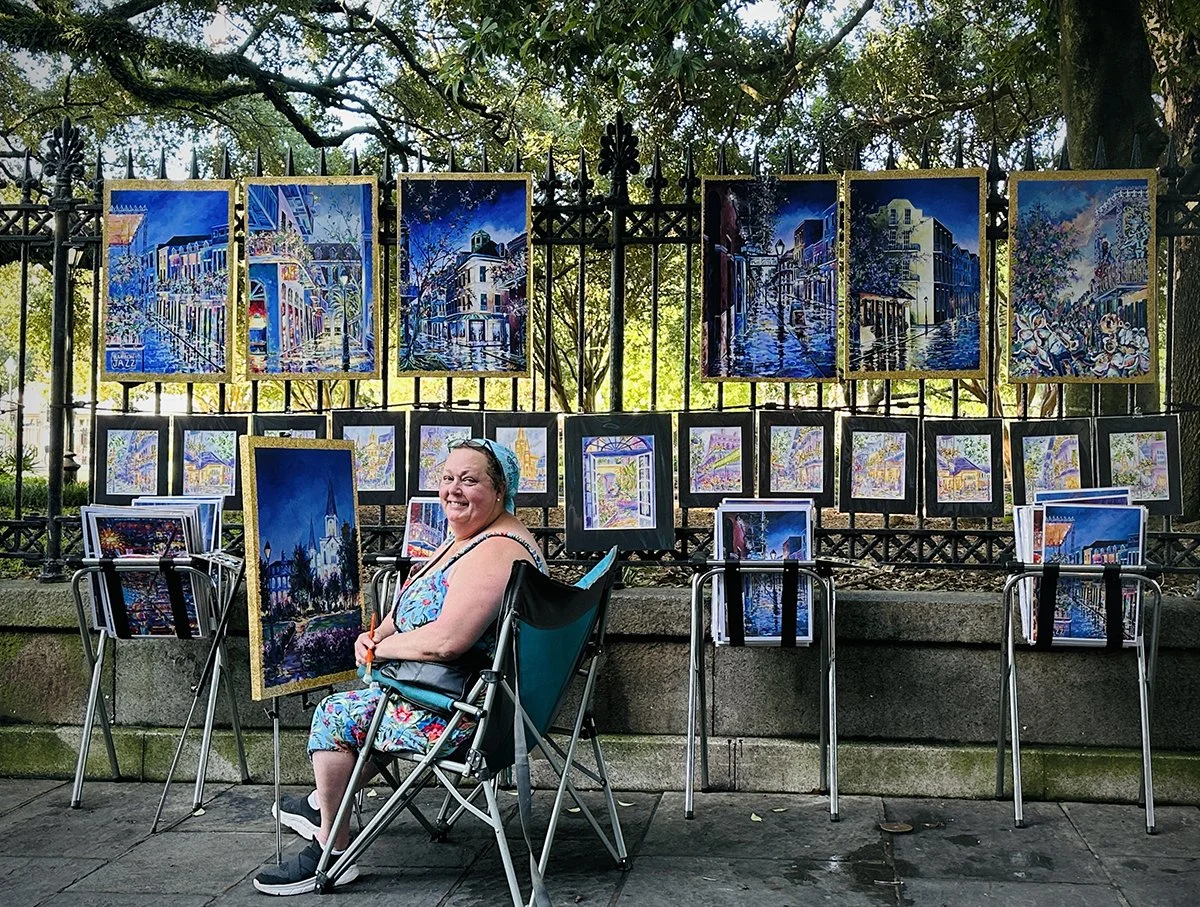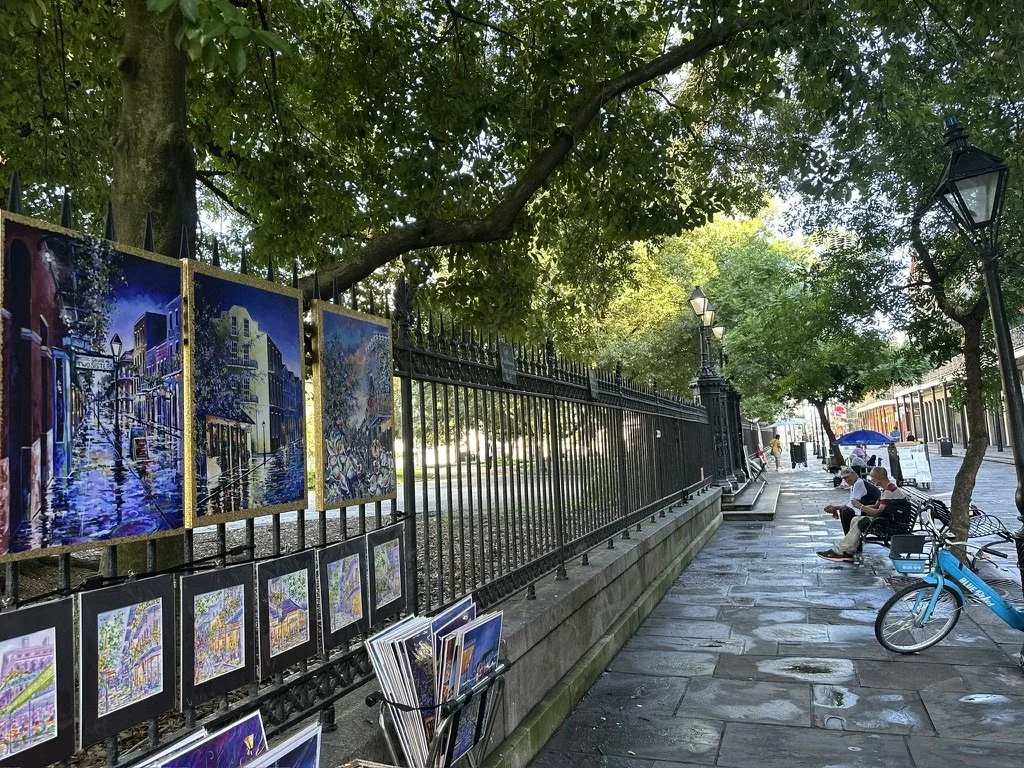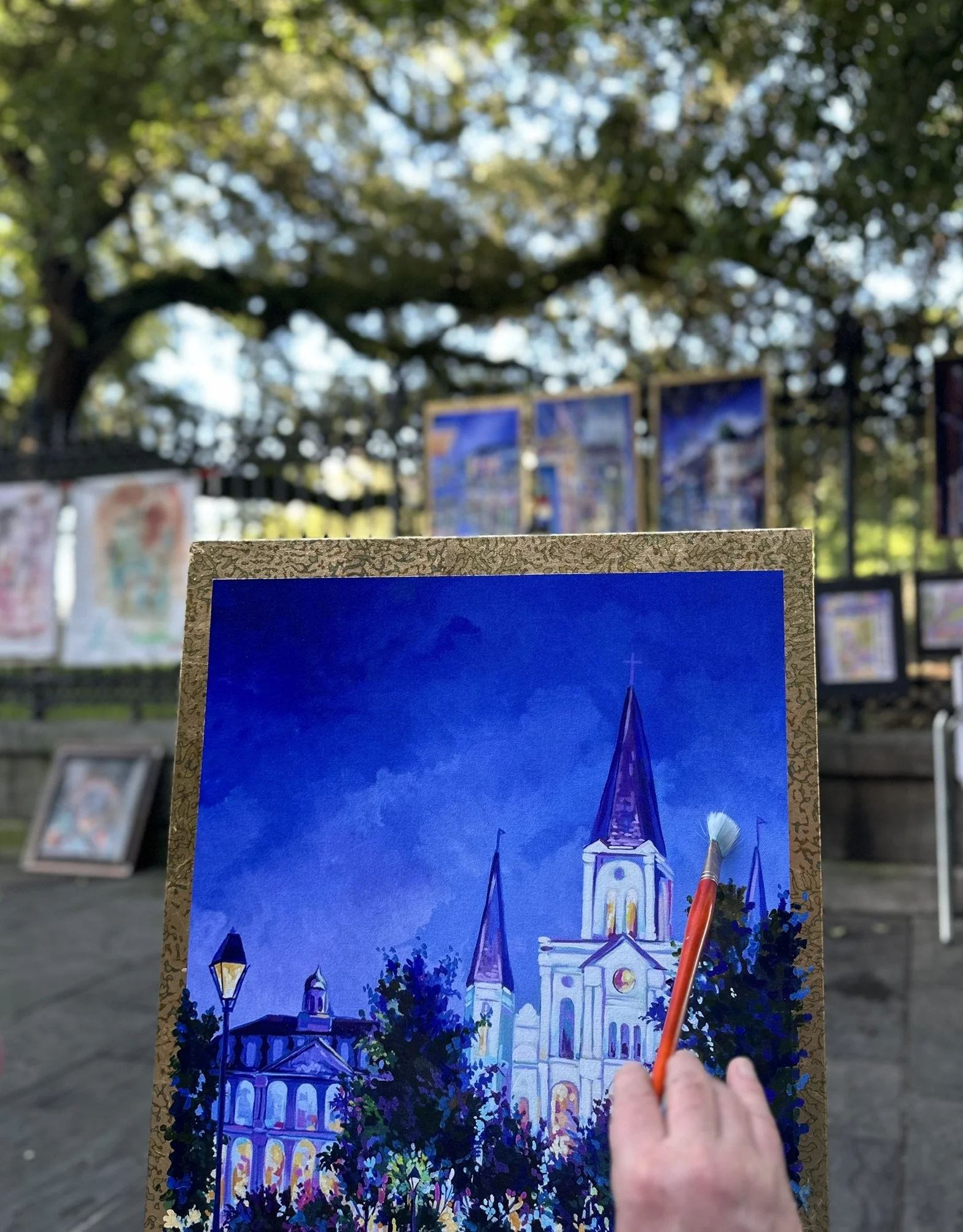Elaine Adel Cummins: The World Comes to You
Elaine Cummins on a recent Saturday morning at Jackson Square. Photo by Ellis Anderson
July 2025A second-generation Jackson Square artist, Elaine Cummins got her first license to “hang on the fence” when she was only 16 - and more than forty years later, she’s still happily there.
-by J. Michael Warner
This column is underwritten in part by Karen Hinton & Howard Glaser
It was the Riviera on the Mississippi, that cool spot under the Gov. Nicholls Street Wharf. Ten-year-old Elaine Samuel escaped the summer heat while her mother painted portraits at Jackson Square.
That was the summer of 1975. The wharf shaded a small beach where Elaine and her friends could swim in the river and laze about on a cargo net strung between creosoted pilings like a giant hammock, watching ships float by. Nearby, on North Peters Street, the saw at an old icehouse - which was still an essential business in the ‘70s – exhausted deep drifts of shavings beneath its elevated deck. Elaine would crawl beneath the deck, pack the ice into snowballs and sweeten it with sugar packets she had stolen from Café du Monde, sharing with her friends and sister.
Saundra Bolen, Elaine’s mother, began her career as a Jackson Square portrait artist in 1963, when it was unusual to find women in that role. Elaine’s father, Jac Samuel, was a bookbinder who tried to unionize his employer’s workers. The effort failed and Jac decided to seek employment in California. But Saundra was already established in New Orleans and chose to stay in the city.
“She had seven kids,” said Elaine recently. “Keeping a roof overhead and food in the kitchen were her priorities. We were pretty much left to raise ourselves. No judgment against Mom. She was doing as good as she could.”
Saundra Bolen, Elaine’s mother was also a Jackson Square artist. Photo courtesy Elaine Cummins
Elaine Adel Cummins (the name she took after marriage, and the name she uses for her work) is a Jackson Square artist now, too, and has been there since she was fourteen or fifteen years old. Before that, she’d often go to the Square with her mother and hang out with the other artists. Sometimes she would shill for them.
“I was a cute little girl and they’d pay me ten cents to sit there and they’d start a portrait.” But as soon as a tourist showed interest, Elaine got the boot and the customer would move into the seat.
Saundra’s boyfriend, another portraitist, was in on it too. One spring day, rumor came down Chartres Street that Truman Capote and his entourage were making a grand tour of the Quarter. As the group passed the Square, the boyfriend told Elaine that he’s pay her five dollars if she could get Capote to sit for a portrait.
Little Elaine had no idea who Truman Capote was, and could barely pronounce the name. But five dollars seemed an outrageous fortune.
Elaine as a young girl, courtesy Elaine Cummins
“Truman Capote, Truman Capote, Truman Capote,” she repeated under her breath as she chased the group up Chartres toward Canal Street. She finally caught up.
“Are you Truman Capote?” she asked a tiny man at the center of the crowd.
He rotated towards her, and with a high-pitched, nasally drawl said, “No, I’m not.” The entourage giggled.
Disappointed, Elaine trudged back to the boyfriend, who told her, well of course it was him.
But she still didn’t believe it. Why would the odd little man tell her something untrue?
Years later, though, she saw an interview of the author on television. “And I realized it was him, and what a rotten man, so bad!” she said, laughing.
Even at the age of eight or nine, Elaine would wander the streets alone or with her friends.
“At that age I wasn't technically allowed to leave [my mother’s spot on the Square], but she turned her head and in one second I was gone.” Her childhood was spent scrounging through the French Quarter.
Elaine’s wanders were mostly in the pursuit of food. There was Oscar at the cocktail bar over at the Royal Orleans Hotel. He would give her a cup of olives and cherries, and maybe a sugar stick. The Lucky Dog man gave her mustard and onions on a napkin.
Behind the Ursuline Convent there was an old boxing ring, and by the ring stood a large pomegranate tree, sometimes heavy with fruit. Elaine would sneak off with an armful.
The doorway of St. Mary’s on Chartres Street, “Hic domus dei est et porta coeli.” Photo courtesy Vieux Carré Commission Virtual Library
A couple with the improbable names of Dick and Jane lived on Dumaine Street between Chartres and Decatur. They had cookies and Dr. Pepper, a drink the child had never before tasted. Another woman named Esther fed her Fritos and let Elaine pet her cat, Minou.
“And so I had my little pitch,” said Elaine. “It was like I did my rounds.”
Tour buggies operated then too, often drawn by a sad old horse wearing a straw hat. Elaine would run up behind the carriage and jump onto the back, balancing herself above the axle. “Real artful dodger stuff,” she said.
One day, the buggy driver guided his tourists past St. Mary’s Church at 1116 Chartres. He pointed to an engraved motto above the door. Hic domus dei est et porta coeli, it said. The driver translated: This is the house of God and the gate of Heaven.
But from her vantage above the back axle, Elaine could see a sign taped to the church entrance: “Please Use Other Door.”
Elaine generally stayed within the four corners of the French Quarter as a child. But back when the Moon Walk along the Mississippi was barely a stretch of concrete, the young girl and her brothers would hop the freight trains and go for a ride, sometimes to the International Trade Mart where they could enjoy the air conditioning.
“I remember looking at the ITM as a very little girl,” she recalled. “And I said one day my art will be here, in this building.”
Sometimes she would walk along the levee, where gentlemanly drunkards would imbibe, watching the Mississippi River roll past. Back then, many of those men wore suits and ties – despite being unhoused and living in cardboard under the wharfs.
“I do wish the world would see the French Quarter as once it was: Courtyards open to the tourists, so they could wander in and cool off on hot summer days. Old ladies making pralines and little makeshift brick-a-brack shops. That rundown old French Quarter had a wondrous charm.”
Elaine Cummins at 16, when she obtained her first license to work on the square as an artist. Photo courtesy Elaine Cummins
Though she loved wandering the streets, Elaine began her art career around the age of seven. Every day, she would make the rounds on the square, harvesting pastels that artists would toss out when the sticks grew too short.
At nearby Dixie Art Supplies store, Elaine would salvage the long strips of pastel paper that remained when artists cut larger sheets to size. The women at the shop let the little girl use the enormous guillotine chopper in the back (liability be damned) to slice up those strips into small rectangles.
Using her little cigar box of pastel stubs, the budding artist created dynamic sketches of St. Louis Cathedral or other French Quarter scenes. The owners at Dixie lined the pictures in their window, and to Elaine’s delight, they sold!
She’d also find an open spot along the Square’s iron fence, where she’d line up her pastel sketches and sell them for a nickel or a dime apiece. “No sooner had I done a batch and they sold,” she said.
By the time she was fourteen, Elaine had moved on to portraits, and two years later, she obtained her first city permit to work from the fence. And a girl that young doing good work was quite a draw.
“Portraits are actually very simple when it comes right down to it,” she said. “There's only really about three faces [that an artist has to master].”
Elaine learned to keep her ears open while on the Square. There were success stories, stories of hardship. Life lessons about personalities - who was friendly and who to avoid. Lessons about methods and techniques. Discussions about color theory and tips about how to attract customers and keep them entertained.
Elaine at Jackson Square, photo courtesy Elaine Cummins
And the jokes.
Like, “Ohh, you know, someone would say it took ‘So and So’ five years to find that particular yellow. And someone would bark out, yeah, it's because he was never sober.” Or if another artist was asked for an opinion on a work of art, the answer often was, “That’ll sell.” Turns out, that’s the answer for most works because it’s just a matter of getting the right customer interested.
And the artists were colorful. Captain Bill wore a naval officer’s cap and sported a big, white beard. He used a nail to sketch nautical scenes on slate. Collette Pope Heldner, now a big name in New Orleans auction houses, painted swamp scenes and courtyards.
Her own paintings reflect her colorful nature. Her subjects are the neighborhood she knows best and her palette is weighted on the blue side with vibrant pops of reds, oranges and yellows.
“For a particular twilight after it rains, it's most spectacular. So I try and capture that. Like a kaleidoscope.”
Napoleon House on Chartres Street. Elaine managed to capture all four corners of the intersection in this shot.
One of Elaine’s watercolors of Pirates Alley
All in all, Elaine’s spent more than 25 years of her life as part of the Jackson Square arts colony. She did spend a few years away from her art to devote time to being a mother. She also spent ten years creating and selling a hand-painted clothing line at the French Market because it provided a more reliable income as she raised her daughter.
Yet Elaine believes that many people see the life of a Jackson Square artist as being “very one-dimensional.”
“That has certainly not been my life,” she said. “The role I have played is certainly more than making and selling art on the fence - though that’s a respected and noble profession.”
photo courtesy Elaine Cummins
While she’s passionate about her artwork and life in the Quarter, the artist is equally as passionate about contributing to her community - whether it’s gifting artworks to charities like the Ronald McDonald House or the American Diabetes Association.
Elaine (second from left) accepting award from the American Diabetes Association, photo courtesy Elaine Cummins
And she’s also taken on large commissions that have given her work a far wider audience – like painting a mural for the 50th anniversary of Jazz Fest and producing floor-to-ceiling wall coverings for the Vue Orleans Observatory atop the Four Seasons Hotel - once the International Trade Mart.
Yes, that childhood dream has manifested.
Mural for the 50th anniversary of Jazz Fest, photo courtesy Elaine Cummins
Mural for the 50th anniversary of Jazz Fest, photo courtesy Elaine Cummins
Mural for the 50th anniversary of Jazz Fest, photo courtesy Elaine Cummins
Elaine with one of the life-sized wall coverings she created for the Four Seasons Hotel (the former ITM building). Photo courtesy Elaine Cummins
In good weather, Elaine can now be found on the Square several times a week, selling acrylics on canvas. She still focuses on scenes in the French Quarter – the neighborhood where she knows every crack in the sidewalk, every backstory, every wrinkle in its storied past. In her spare time, she’s the admin for the popular Facebook page “Old New Orleans Photos” that explores deep neighborhood history.
“We have a saying here on Jackson Square,” Elaine said, smiling, her eyes sparking with fun and mischief. “If you sit there long enough, the world comes to greet you. And I have seen the world in a way people rarely get the opportunity to experience.
“Being here gives me a constant stream of discovery, history – and extraordinary beauty.”
Find more of Elaine’s work on her website or on Instagram. Or make a trip to the Vue Orleans Observatory atop the Four Seasons Hotel, where they’ve installed life-sized wall coverings of Elaine’s work. 

















